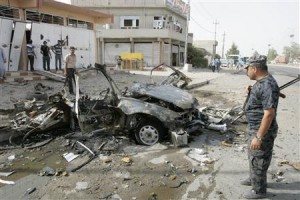 A wave of shootings and bombings that Iraqi officials said bore the hallmarks of al Qaeda killed more than 80 people and wounded more than 270 across the country Thursday.
A wave of shootings and bombings that Iraqi officials said bore the hallmarks of al Qaeda killed more than 80 people and wounded more than 270 across the country Thursday.
Insurgents carried out attacks in Baghdad and Kirkuk, Salaheddin, Anbar, Wasit and Diyala provinces, according to police and Interior Ministry officials.
The violence came in the final days of the holy month of Ramadan, when Iraqis traditionally fill shops and markets to prepare for the Eid feast.
Iraqi authorities blame al Qaeda for what they describe as coordinated assaults targeting mostly Shiite areas.
In the latest violence on Thursday night, a car bomb followed by a roadside bomb exploded outside shops on a busy road in Baghdad’s Zafaraniya district, killing 31 people and wounding 56, police officials told CNN.
Meanwhile, 15 gunmen killed 10 Iraqi soldiers in an attack on a military post north of Baghdad, police said, while in the southern city of Kut in Wasit province, a car bomb killed five people and wounded 70, according to police and health officials said.
In addition, three car bombs and two roadside bombs exploded in three separate locations in Kirkuk, killing seven people. Gunmen also attacked a police checkpoint and a police station in and near the Anbar city of Falluja, killing seven people, including six police officers.
In Baghdad’s Sadr City, a car bomb explosion outside a popular restaurant killed 16 people and wounded 49, police said, while two other car bombs in Baghdad neighborhoods killed six other people. Bombs also killed one person east of Tikrit in Salaheddin and another in Diyala.
The tally of wounded included 146 in Baghdad, 70 in Kut, 49 in Kirkuk and 21 in Diyala, Salaheddin, Anbar and at the military post north of the capital, according to police.
Violence had generally dropped in Iraq in recent years compared to the middle of the last decade, when Sunni-Shiite conflict raged during the height of the Iraq war.
However, it hit a nearly two-year peak in July with 325 deaths reported, the Interior Ministry said. That’s the deadliest single month since August 2010, when the toll was 426, the ministry said. U.S. troops completed their withdrawal from Iraq in December.
The Islamic State of Iraq, an umbrella group that includes a number of Sunni extremist organizations and has ties to al Qaeda in Iraq, claimed responsibility for July 31 attacks that targeted the Emergency Police Headquarters and the Major Crimes Directorate. Those attacks left 27 people dead.
Douglas A. Ollivant, an Iraq expert, said Iraq is “a fragile state deeply traumatized and riven by 30 years of war, sanctions, occupation and civil strife.”
In an August essay on the Council on Foreign Relations website, he said that since the U.S. withdrawal, Iraq has been engulfed in a “fierce political stuggle” between Prime Minister Nuri al-Maliki and Sunni rivals, as well as tension between the prime minister and some Kurds.
“Although there are numerous positive signs of progress in Iraq — violence has fallen to its lowest level since 2003, its economy is growing modestly, oil production recently surpassed that of Iran, and foreign investment is beginning to restore infrastructure decayed by years of war and sanctions — the risk of acute instability and renewed conflict remains,” Ollivant said.
“For the positive trends to continue, Iraq will need to contain various threats to internal stability and weather regional turmoil that could worsen significantly in the coming months,” he said.
CNN

Leave a Reply
You must be logged in to post a comment.